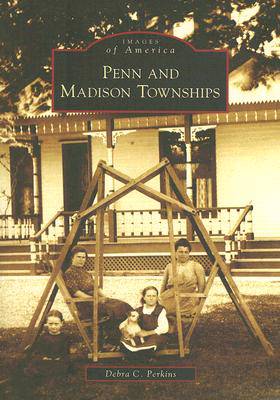
- Afhalen na 1 uur in een winkel met voorraad
- Gratis thuislevering in België vanaf € 30
- Ruim aanbod met 7 miljoen producten
- Afhalen na 1 uur in een winkel met voorraad
- Gratis thuislevering in België vanaf € 30
- Ruim aanbod met 7 miljoen producten
Omschrijving
In the 1830s, the earliest settlers traveled routes on foot and via horseback, road cart, ox-drawn wagons, and buckboards, following winding paths in an effort to avoid the swamps.Although hardships and inconveniences were endured, one gentleman described their advantages upon arrival: The soil of Madison and Penn Township is of inexhaustible fertility and the population is to great extent of vigorous Pennsylvania stock. As early settlers arrived, they cut trees for lumber for their homes and to clear ground for farming. This land became some of the best farmland in the region. As the Wabash Railroad, Lake Shore Railroad, and the Grand Trunk were erected in the towns of Wyatt and Osceola, businesses sprang up, along with schools, churches, grocery stores, sawmills, gristmills, blacksmith shops, post offices, and physicians' offices. The railroads were used to ship lumber and crops, and lumbering continued as waves of settlers built new homes and barns at a rapid pace. As dairy farming spread, creameries were established where farmers could separate their milk and cream--the farmers fed their cattle the skimmed milk, while the cream was made into butter and sold in the local general stores. This area is still some of the best farming ground in St. Joseph County. Through over 180 historical photographs, Penn and Madison Townships captures the rural way of life that has existed in this region for over 160 years. Family, farming, and tradition, the strengths of these small rural centers, are seen in the enclosed history and are still visible in the communities today.
Specificaties
Betrokkenen
- Auteur(s):
- Uitgeverij:
Inhoud
- Aantal bladzijden:
- 128
- Taal:
- Engels
- Reeks:
Eigenschappen
- Productcode (EAN):
- 9780738540726
- Verschijningsdatum:
- 6/09/2006
- Uitvoering:
- Paperback
- Formaat:
- Trade paperback (VS)
- Afmetingen:
- 167 mm x 236 mm
- Gewicht:
- 326 g

Alleen bij Standaard Boekhandel
Beoordelingen
We publiceren alleen reviews die voldoen aan de voorwaarden voor reviews. Bekijk onze voorwaarden voor reviews.











